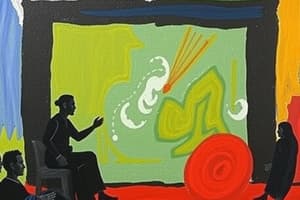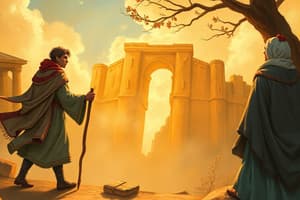Podcast
Questions and Answers
What are the Classical Unities based on?
What are the Classical Unities based on?
Aristotle's Poetics
What are the three unities?
What are the three unities?
- Unity of time (correct)
- Unity of characters
- Unity of action (correct)
- Unity of place (correct)
What is the definition of unity of time?
What is the definition of unity of time?
Between sunset and sunrise
What is the definition of unity of place?
What is the definition of unity of place?
What is the definition of unity of action?
What is the definition of unity of action?
What is Alexandrine verse?
What is Alexandrine verse?
What is Le Roman d'Alexandre?
What is Le Roman d'Alexandre?
Who is Jean Racine?
Who is Jean Racine?
What year was Ronsard elected to the Academie Francaise?
What year was Ronsard elected to the Academie Francaise?
List one of Racine's works.
List one of Racine's works.
Who is Phedre?
Who is Phedre?
Who is Phedre's husband?
Who is Phedre's husband?
Who is Hippolyte?
Who is Hippolyte?
Who is Oenone?
Who is Oenone?
Who is Aricie?
Who is Aricie?
Flashcards are hidden until you start studying
Study Notes
Classical Unities
- Originated from Aristotle's Poetics, focusing on the essence of tragedy.
- Central to the structure of classical drama, emphasizing coherence in storytelling.
The Three Unities
- Unity of Time: Action occurs within a single day, specifically from sunset to sunrise.
- Unity of Place: The entire narrative unfolds in one location or setting.
- Unity of Action: Avoidance of subplots; the story follows one primary situation without distractions.
Alexandrine Verse
- Characterized by 12 syllables per line, with significant stresses on the sixth and final syllables.
- Key structure underpinning French classical poetry and drama.
Le Roman d'Alexandre
- First significant work in Alexandrine verse from the 12th century.
- Revived in the 16th century by La Pleiade, particularly through the works of Ronsard, reaching its peak in the 17th century.
Jean Racine
- Renowned as a master of French classical tragedy, prominent in the 17th century.
- His plays exhibit a blend of rigor and simplicity, rich in descriptive detail, often drawing from Greek and Roman themes.
Ronsard's Contribution
- Elected to the Académie Française in 1672, a notable honor reflecting his influence on French literature.
Racine's Major Works
- Andromaque (1667): A tale of love and betrayal.
- Britannicus (1669): Political intrigue and family drama.
- Berenice (1670): Explores themes of love and sacrifice.
- Phedre (1677): A tragic narrative about forbidden love and fate.
Phedre's Character Relationships
- Phedre: The protagonist, daughter of King Minos and Pasiphae, struggles with her forbidden love.
- Theseus: Phedre's husband, a heroic figure from Greek mythology.
- Hippolyte: Son of Theseus and queen Antiope, caught in the tragic web of his mother's desires.
- Oenone: Phedre's nurse and confidante, serves as a critical support character.
- Aricie: A princess of royal Athenian blood, involved in the dramatic conflict.
Studying That Suits You
Use AI to generate personalized quizzes and flashcards to suit your learning preferences.




